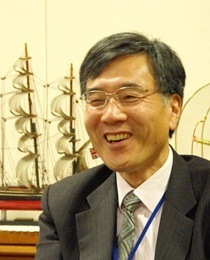Interview【JICA-RI Focus Vol. 29】Interview with Director Ichiro Tambo
2014.11.14

This October 2014, Mr. Ichiro Tambo was appointed as the new director of JICA-RI. Director Tambo talks about the concept of "human security," a guiding principle of JICA and JICA-RI's activities, the strengths and challenges of JICA-RI, and future initiatives.
Upon your appointment as Director, you stated that "human security" should be a guiding principle of research activities of JICA-RI. Could you tell us about your reasons for that?
The concept of "human security" refers to the safeguarding of people's freedom from fear and want, ensuring that they can live in safety and dignity. It aims to protect the vital core of all human lives in ways that enhance human freedoms and human fulfilment. The causes and actors in today's conflicts are diverse. In conflicts such as civil wars, cross-border disputes, and terrorism, where states do not necessarily function, securing lives of people is a difficult challenge. However, development cannot be achieved without peace and stability. Therefore, "human security" is of critical importance for development practitioners.
Just before the 1994 massacre in Rwanda, I was engaged in the operation to close the JOCV office in Kigali. I was among only two Japanese in Kigali, left in a tense situation where we could have been killed at any time and any place. As a person engaged in development, I have never felt the importance of "peace" as strongly as I did at that time. This experience made me think that we have to create a world where each human can live with peace. Peace and stability should be the basis for development. I therefore expect JICA-RI to conduct research that builds firmly on the concept of "human security" and reflect this in all our research projects.
What are the strengths and comparative advantages of JICA-RI?
I consider JICA's strength to be that it is an implementing agency with project sites on the ground that can provide evidence for practical and constructive discussion. When I was working for organizations such as the Organization for Economic Co-operation and Development (OECD), for instance, there was an argument within the international community over aid harmonization that we should shift from project-based support to general budget support. However, this policy debate was not necessarily based on evidence that general budget support is more effective. Discussion among development partners should be practical and based on evidence. We should also keep this in mind when we JICA discuss the effectiveness of our own development assistance. JICA as an implementing agency with project sites in the field, should accumulate evidence built on actual development activities and share them widely. JICA-RI can provide evidence with scientific and academic proof. This is the greatest strength.
JICA-RI's role in making connections of researchers both within and/or outside Japan is another advantage. For instance, the research project "Japan and the Developing World: sixty years of Japan's foreign aid and the post-2015 agenda" provides a good opportunity to look back over JICA's past projects and lessons learned toward the future of international cooperation between Japan and other stakeholders. I am confident that JICA-RI will contribute more to JICA's operations by functioning as a platform to bring many distinguished researchers together.
What are the challenges that JICA-RI should address in the future?
JICA-RI should not remain as a mere academic institution. We should aim to be useful for JICA's practitioners. If the research findings are useful for JICA's work, they will also be useful for the Japanese government, the governments of developing countries, other international organizations, development consultants, and the staff of NGOs. The importance of research that is "rooted in the sites" both qualitatively and quantitatively cannot be overemphasized.
Another research domain that I am interested in is to clarify the essence of the specific Japanese type of cooperation and the excellence of JICA's cooperation. There is "tacit knowledge," which is reflected in Ikujiro Nonaka's model of organizational knowledge creation, in every successful Japanese type of cooperation. I am committed to work on the establishing such knowledge with academic proof. Furthermore, I would also like to enhance our public relation activities to gain better understanding from the public. One such example will be our signature publications on "Project History" that have compiled the JICA's experiences from various perspectives on a long-term basis beyond project's official reports. Again I put the emphasis on "human security." We should find a way of development to secure human security in the trilateral relationship between development, peacebuilding and diplomacy. Anchoring "human security" in our research activities, I have confidence in our ability to contribute to the improvement of JICA's operations and to address emerging global issues with development partners.

事業事前評価表(地球規模課題対応国際科学技術協力(SATREPS)).国際協力機構 地球環境部 . 防災第一チーム. 1.案件名.国 名: フィリピン共和国.

事業事前評価表(地球規模課題対応国際科学技術協力(SATREPS)).国際協力機構 地球環境部 . 防災第一チーム. 1.案件名.国 名: フィリピン共和国.

事業事前評価表(地球規模課題対応国際科学技術協力(SATREPS)).国際協力機構 地球環境部 . 防災第一チーム. 1.案件名.国 名: フィリピン共和国.

事業事前評価表(地球規模課題対応国際科学技術協力(SATREPS)).国際協力機構 地球環境部 . 防災第一チーム. 1.案件名.国 名: フィリピン共和国.

事業事前評価表(地球規模課題対応国際科学技術協力(SATREPS)).国際協力機構 地球環境部 . 防災第一チーム. 1.案件名.国 名: フィリピン共和国.
scroll